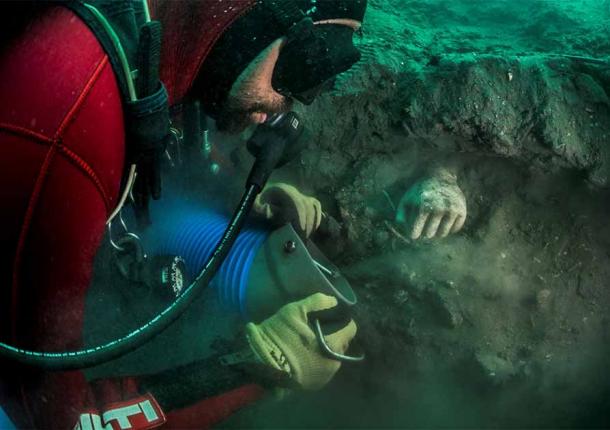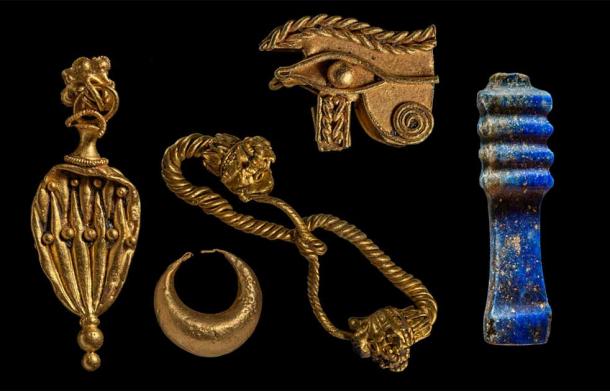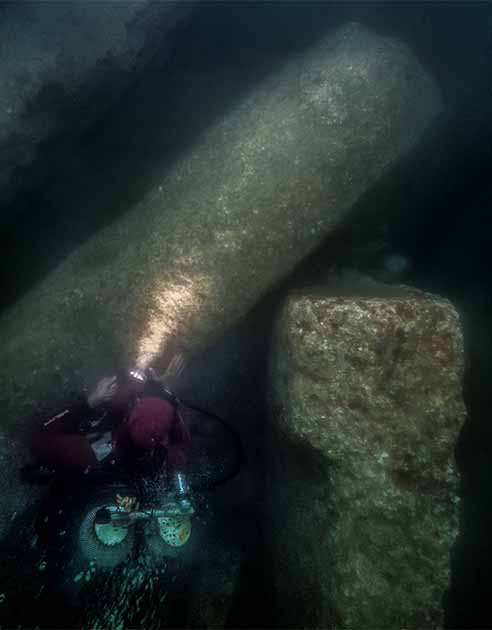Along a canal off the coast of Egypt in the Mediterranean, archaeologists have made a remarkable discovery in the ancient port city of Thonis-Heracleion in Egypt. They have uncovered evidence of coexisting temples – one dedicated to the Greek goddess Aphrodite, and another paying homage to the ancient Egyptian deity Amun. In addition to these, an underwater treasure trove was found in the vicinity.
A Sinking Feeling: Taken by The Flood
This sunken temple suffered a partial collapse during a catastrophic event in the mid-2nd century BC and had originally been erected in honor of the Egyptian god Amun. It held immense significance, as it served as the place where Egyptian pharaohs would come to receive the divine blessings and titles of universal kingship bestowed upon them by the supreme god of the ancient Egyptian pantheon, Amun, as revealed in a statement from the European Institute for Underwater Archaeology (IEASM) .

A votive hand is emerging from the sediment during an archaeological excavation in Thonis-Heracleion. End of 5th century BC-early 4th century BC, probably from Cyprus. Photo: Christoph Gerigk ©Franck Goddio/Hilti Foundation
The sunken city of Thonis-Heracleion initially came to the world’s attention in the year 2000. It was rocked by earthquakes and tsunamis in the 2nd century BC, and finally met its end in the 8 th century AD. In the blink of an eye, this bustling city was swallowed by the Mediterranean Sea, disappearing beneath the waves. Over the subsequent centuries, the memory of Thonis-Heracleion faded and it remained a forgotten chapter in history, concealed beneath the ocean’s depths into the Nile delta. The former metropolis is now submerged approximately 4.3 miles (7 kilometers) from Egypt’s contemporary shoreline.
The European Institute for Underwater Archaeology (IEASM), under the continued guidance of Franck Goddio, engaged in a collaborative mission in conjunction with the Department of Underwater Archaeology within the Ministry of Tourism and Antiquities of Egypt at this site.
While investigating the temple’s submerged ruins, archaeologists uncovered treasures like meticulously crafted silver ritual instruments, exquisite gold jewelry, and delicately carved alabaster containers that once held aromatic perfumes and greasy ointments, known as unguents.
“It is extremely moving to discover such delicate objects, which survived intact despite the violence and magnitude of the cataclysm,” Franck Goddio , president of IEASM and a French underwater archaeologist who led the excavations, said in the statement.
- Finding the Lost City of Heracleion: Encountering Myth Under the Waves
- 2,400-Year-Old Fruit Baskets Found Underwater at Thonis-Heracleion

Gold objects, jewelry and a Djed pilar, symbol of stability, made of lapis lazuli were retrieved. Thonis-Heracleion, 5th century BC. Photo: Christoph Gerigk ©Franck Goddio/Hilti Foundation.
Uncovering the Sanctuaries of Amun and Aphrodite
Divers made another intriguing discovery – subterranean structures that were supported by remarkably well-preserved wooden posts and beams, with origins dating back to the 5th century BC, as well as huge temple blocks.
Located east of the temple, the archaeologists unearthed a Greek sanctuary dedicated to Aphrodite. Aphrodite, a prominent figure in Ancient Greek mythology, was the goddess of love, beauty, pleasure, passion, and procreation. Notably, she occupied a central position among the Greek pantheon of gods and goddesses, reports Heritage Daily .
Amun meanwhile, was a central figure in ancient Egyptian mythology and religion. He held the esteemed status of “King of the Gods.” Often depicted as a deity with a ram’s head or wearing a crown adorned with two tall plumes, Amun’s attributes encompassed creation, fertility, air, and invisibility. His name, “Amun,” translates to “the hidden one” or “the concealed one.”
- Subaquatic Temple and Countless Treasures Discovered in Egypt’s Sunken City of Heracleion
- Precious Treasures from Ancient Heracleion to be Revealed

After excavation, an archaeological diver gazes at the huge blocks of the Amun temple, which fell in the mid-second century BC in the South canal of Thonis-Heracleion. They were discovered under 3 m of hard clay. Photo: Christoph Gerigk ©Franck Goddio/Hilti Foundation.
This sanctuary also yielded a wealth of artifacts, including imported bronze and ceramic objects, and a cache of Greek weaponry too. This discovery hints at the possibility that Greek mercenaries may have once inhabited this region, potentially serving as guardians tasked with defending access to the Kingdom located at the mouth of the Nile’s westernmost branch, known as the Canopic branch, as suggested by the researchers in their statement.
“This illustrates that Greeks who were allowed to trade and settle in the city during the time of the Pharaohs of the Saïte dynasty (between 688 BC and 525 BC) had their sanctuaries to their own gods,” the archaeologists concluded in the statement.
Since the remarkable discovery of the sunken city, the site has yielded a trove of 64 well-preserved ships, a staggering 700 anchors, a cache of gleaming gold coins, colossal statues standing at an impressive five meters in height, and, notably, the remains of an expansive temple dedicated to the god Amun-Gereb in 2019.
Top image: A delicate bronze duck-shaped pourer is discovered amongst ceramics of the 4th century BC on the site of a newly discovered Greek sanctuary to Aphrodite in Thonis-Heracleion. Photo: Christoph Gerigk ©Franck Goddio/Hilti Foundation
By Sahir Pandey





